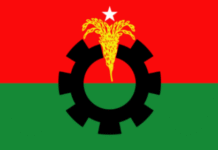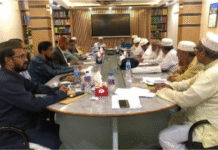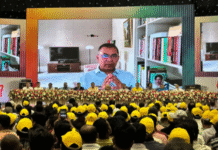Hefajat: All change?
Kamal Ahmed November 19, 2020

The identity of the Hefajat-e-Islam’s new leadership was in the end no surprise. The two leaders below the late Allama Shafi and his son graduated to the top rungs of the ladder. Maulana Junaid Babunagari, who was the secretary general, got elevated to the position of amir and Maulana Nur Hossain Kashemi, the naib-e-amir, moved up to the office of the secretary general.
The decisions were made and announced at the 15-member Shura council which was held at Al-Jamiatul Ahlia Darul Ulum Moinul Islam madrasa, better known as Hathazari Madrasa, which is the main bastion of the Kawami movement. Overseen by late Allama Shafi, the Hathazari madrasa remained the centre point of the Kawami movement representing thousands of unregulated Kawami madrasas of the country. Allama Shafi, prior to his death, lost his control over the Hathazari madrasa following a power struggle between two rival factions that forced out his youngest son Maulana Anas Madani and his associates.
More interesting is the nature of the relationship between this new Hefajat leadership and the Awami League government.
At first glance, it would not appear good for the government. Maulana Babunagari was known to be a critic of the government and committed to pursuing a stronger conservative Islamist agenda and Maulana Nur Hossain Kashemi was the general secretary of Jamiat-e-Ulamaye Islam, a component in the opposition BNP-led 20-party alliance — though since taking on his new position at Hefajat, he has announced his intention to resign .
Babunagari and Kashemi were also both known opponents of some of the policies and actions of late Allama Shafi, most notably his support of the ruling alliance in the national election in 2018. Both men stayed away from the mass-reception held at Suhrawardy Udyan in Dhaka in support of the government’s decision to recognise Kawami qualifications equal status to university degrees, where Sheikh Hasina was awarded the unique title of Kawami Mother.
It has been assumed that the duo would use their leadership to change the direction of the organisation by distancing itself from the government, especially on issues like relations with India and policies that they think are not consistent with conservative interpretations of Islam, might turn out to be wrong.
However, Babunagari’s comments during the anti-French protest suggest that might not be the case. There, he said, and I paraphrase, that he “prays for the current government to continue in power for another hundred years, but protect Islam”. This raised eyebrows among his followers and observers alike as this seemed to go against his previous position. Suspicions abound that the government might have reached out to him with some kind of understanding similar to the one it had with Allama Shafi following the bloody crackdown on May 5th 2013 on their Dhaka siege action programme.
A behind the scenes deal is certainly possible. The leading Bangla newspaper, Prothom Alo, has reported that former minister and Jatiya party Co-Chairman Anisul Islam Mahmud met Babunagari the day before the Shura and discussed the new committee. Speculation about such a deal cannot be ruled out as Anisul Islam Mahmud has a reputation of deal making on behalf of the government. The local Awami League MP is also reported to have extended his support to Babunagari and Kashemi.
Newspapers have reported a heavy presence of police surrounding the madrasa suggesting extraordinary measures being taken by the local administration to avoid any unpleasant situation. Facilitating the council, perhaps, is a good indicator of some official blessings.
It is also an indication that the rival pro-Shafi faction within Hefajat has so far failed to entice the ruling party to support it using anti-Jamaat rhetoric. Before the Shura council, two former deputies of Babunagari, joint secretaries general Maulana Muhibullah and Moinuddin Ruhi held two different press conferences in Dhaka and Chittagong where they claimed that attempts were being made by Jamaat-e-Islami to take control of Hefajat.
In Chittagong, Moinuddin, one of Allama Shafi’s brothers-in-law, went as far as accusing Jamaat and its student wing Chhatra Shibir of killing Shafi. The Chittagong press conference was attended by a grandson of Shafi who also alleged that the allama’s youngest son, Maulana Anas Madani, could not be present due to threats to his life.
The organisers of the Chittagong press conference urged Prime Minister Sheikh Hasina to conduct a judicial probe into the matter. This clearly had no impact on the government — perhaps because they realised that the power dynamics in Hefajat had changed and they needed to accept the reality, or because they felt that the risk of Hefajat’s realignment with BNP had now disappeared due to the opposition’s dire organisational state.
It seems that the government will continue its policy of allowing maximum freedom to Islamist groups who it deems as not posing any threat to its authority, while at the same time providing only minimum tolerance to the political opposition and dissent.
The policy of appeasing these Islamist groups, however, has raised alarm among many people including supporters of the government. They argue that government concessions are emboldening the Islamists and as a result their growing demands and pressure may in the future take a political turn. As the absence of a proper opposition in Bangladesh continues, it is certainly possible that in the future these Islamist leaders may again become politically ambitious and seek to become the political alternative to the current government. And if that were to happen, the Awami league itself would be responsible for what would be a real catastrophe.●
Kamal Ahmed is an independent journalist.
🔗 Netra News – Anti-France Protests: Islamist Muscle Flexing
🔗 Netra News – The death of an Allama









